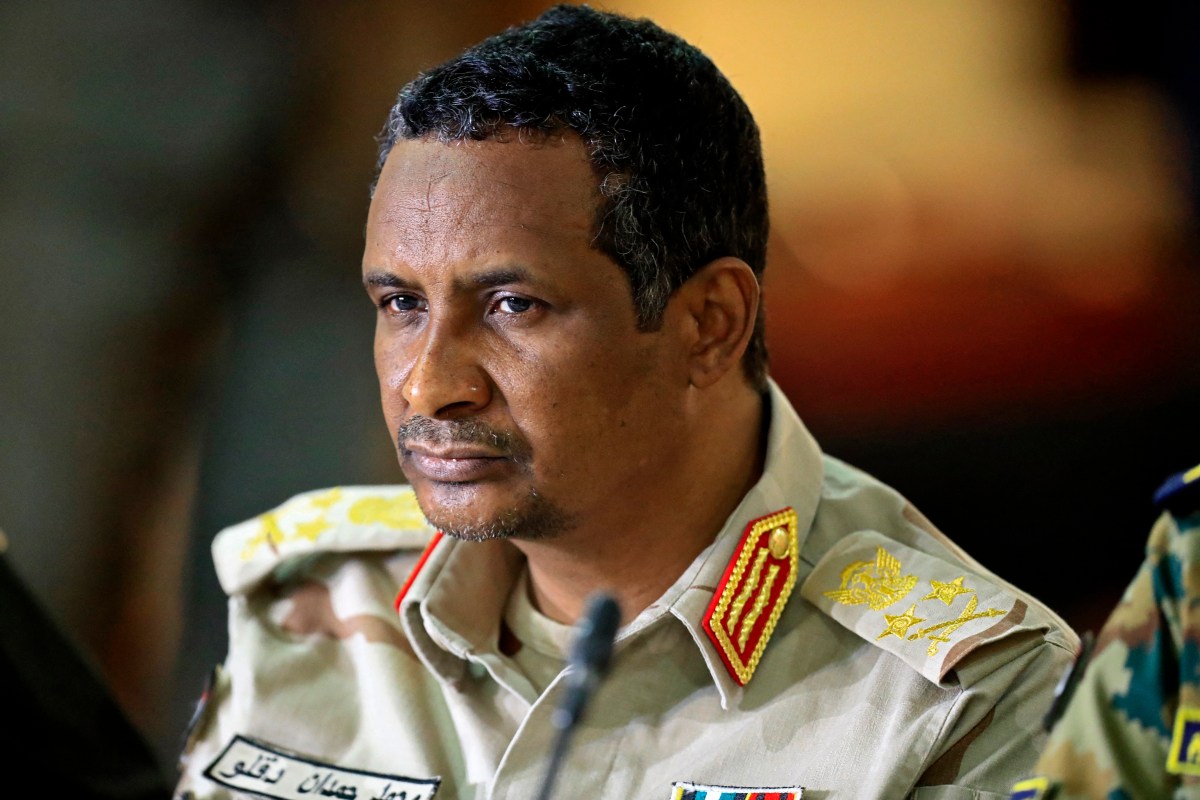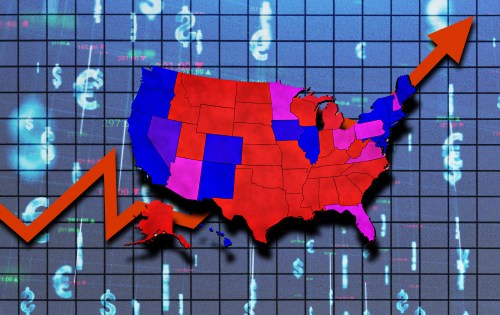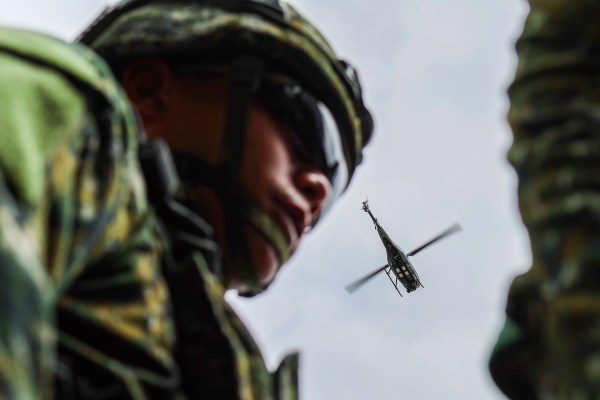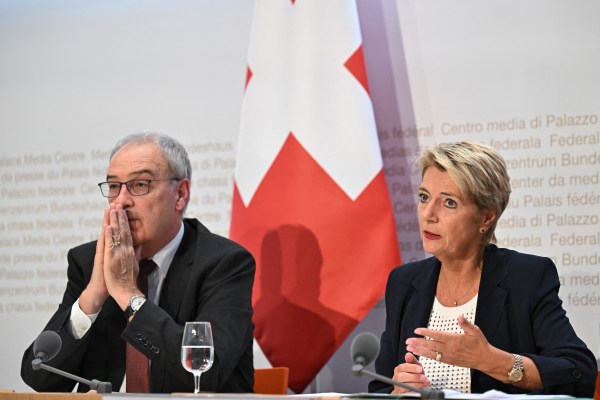Happy Wednesday! President Donald Trump on Tuesday took impromptu questions from reporters as he inspected the White House roof in preparation for future construction. When asked what he planned to build, Trump responded: “nuclear missiles.” Now that’s an HGTV show we could get behind.
Quick Hits: Today’s Top Stories
- Several European countries on Monday and Tuesday pledged to buy a total of $1 billion in U.S.-made weapons, including ammunition for the Patriot air defense system, to send to Ukraine through the NATO arms transfer initiative announced last month. On Monday, the Netherlands committed to spending $578 million, and on Tuesday, Denmark, Sweden, and Norway pledged $90 million, $275 million, and $146 million, respectively. NATO Secretary-General Mark Rutte praised the announcements, saying the initiative would bring “life-saving equipment” and “critical supplies” to the frontline. The news comes as Russia reportedly considers concessions to Trump, including an air ceasefire with Ukraine, to head off sanctions while still allowing Moscow to continue the war.
- Department of Health and Human Services (HHS) Secretary Robert F. Kennedy Jr. announced on Tuesday plans to cancel 22 projects worth $500 million in mRNA vaccine projects. Kennedy claimed in a video posted to X that mRNA vaccines posed “more risk than benefits for these respiratory viruses,” referencing mRNA COVID-19 and flu vaccines, and he said that HHS would be moving toward what he called “safer, broader vaccine strategies” instead of the mRNA programs. Experts warn that ending mRNA vaccine development could prevent vaccine innovations from saving millions of lives.
- Trump on Tuesday threatened to impose several new tariffs, including pharmaceutical levies, which he said could be set as high as 250 percent after a year to a year-and-a-half of a “small tariff.” Additionally, Trump indicated that he could announce new tariffs on semiconductors and chips as soon as next week. Taiwanese chipmaker TSMC produces most of the world’s advanced semiconductors, and on Friday, the Trump administration’s updated 20 percent tariff rate on imports from Taiwan is set to take effect.
- The House Oversight Committee issued nearly a dozen subpoenas on Tuesday to several people related to its investigation into Jeffrey Epstein, including former President Bill Clinton, former Secretary of State Hillary Clinton, and former FBI Director James Comey. The committee also ordered the Justice Department to turn over the “full, complete, unredacted Epstein Files” by August 19, and the deposition dates for those subpoenaed range from mid-August to mid-October. The Justice Department also reportedly is considering releasing the recording of its interview last month with Epstein associate Ghislaine Maxwell, who is currently serving a 20-year prison sentence for sex crimes committed with Epstein.
- Trump on Tuesday accused banks of discriminating against him and his supporters, singling out Bank of America and J.P. Morgan Chase for allegedly refusing to accept his deposits. Trump’s claims came amid reports that he’s preparing to issue an executive order requiring regulators to investigate whether any banks might have violated the Equal Credit Opportunity Act, antitrust laws, or consumer financial protection laws. It would reportedly also direct regulators to investigate “politicized or unlawful debanking” practices.
- It’s already been a big week for AI releases. On Tuesday, Anthropic announced the 4.1 update to its Opus model; Google DeepMind unveiled Genie 3, the first video-generator capable of making consistent, lifelike, navigable three-dimensional spaces; and ElevenLabs released its new music tool, which can generate tunes indistinguishable from real recordings. Most notably, OpenAI announced its latest open-source models, which are basically versions of ChatGPT that you can run on your own computer.
Famine, Fighting Grip Sudan

With international attention trained firmly on the Gaza Strip, another deadly conflict continues to rage in Africa. Fighting in Sudan, often described as the world’s “forgotten war,” has left hundreds of thousands of people dead and forced 13 million from their homes since it began more than two years ago. And it shows no signs of slowing in its third year.
Fighting between the Sudanese Armed Forces (SAF) and the Rapid Support Forces (RSF) paramilitary group began in April 2023, when the two formerly allied armed factions—and the generals who lead them—turned on one another. Fueled by international backers on both sides, the conflict is having devastating consequences for Sudan’s civilian population. Famine, disease, and widespread ethnic violence continue to plague the northeast African country as the Sudanese people bear the brunt of the war.
Both sides have been accused of war crimes, but the RSF in particular has developed a reputation for its brutality. Despite being pushed out of the capital of Khartoum in March, the paramilitary force has solidified and expanded its control elsewhere in the country, seizing territory along the Libyan and Egyptian borders last month. The group has also continued to dig its heels into the Western Darfur region, where it has laid siege on the city of El Fasher.
At the same time, the paramilitary has sought to shore up its political authority in the areas it occupies. Late last month, RSF leader Gen. Mohamed Hamdan “Hemedti” Dagalo declared a rival government, sparking fears that his forces may be laying the groundwork for an eventual partition of Sudan. According to Hemedti, the alternate civilian-led government will be led by 15 people and include regional governors. Mohammed Hassan al-Taishi, a former official in Sudan’s defunct transitional government, was named prime minister.
Both the African Union and the Arab League condemned the creation of Hemedti’s government, arguing it would continue to fragment the country further and prolong the violence. The Sudanese government also rejected the RSF’s declaration of a “New Sudan,” describing the body as an “illegitimate entity declared by the terrorist militia” and urging the international community not to recognize it. Led by Gen. Abdel Fattah al-Burhan, the Sudanese army currently controls most of north and east Sudan, including the capital of Khartoum and Port Sudan, a city on the Red Sea.
But Burhan’s forces are at risk of losing their last remaining foothold in the western Darfur region, where the RSF has intensified its attacks since losing Khartoum. Much of the fighting has focused on El Fasher, the capital of North Darfur, which is currently government-controlled but has been under siege by Hemedti’s troops for more than 16 months. In June, the International Organization for Migration reported that more than 1 million people had fled the city since the start of the conflict amid a near-constant barrage of drones and artillery attacks.
The civilian population of El Fasher also faces a rapidly worsening hunger crisis. The United Nations World Food Program reported Tuesday that it has been unable to deliver aid to the city by road for more than a year, as combatants block all available routes. “Everyone in El Fasher is facing a daily struggle to survive,” Eric Perdison, WFP’s regional director for eastern and southern Africa, said in a statement. “People’s coping mechanisms have been completely exhausted by over two years of war. Without immediate and sustained access, lives will be lost.”
Meanwhile, since mid-June, the city and surrounding areas have been riddled with a cholera outbreak. The United Nations has reported more than 2,000 cases of cholera in the Darfur region, leading to at least 80 deaths as of July 30.
The blockade on El Fasher had compounded a dire nationwide humanitarian crisis. Sudan is currently the world’s only declared famine, with more than 24 million people facing acute food insecurity and an estimated 637,000 facing “catastrophic levels of hunger.” Meanwhile, the large flow of refugees out of conflict zones has stretched local governments and aid groups to their limits. Sudan has the world’s largest internal displacement crisis, with more than 8 million people displaced within the country’s borders, while nearly 4 million people have fled into neighboring countries.
Getting desperately needed supplies to Sudanese civilians is a “two-part problem,” Michelle Gavin, a senior fellow for Africa policy studies at the Council on Foreign Relations, told TMD. For one, humanitarian appeals for the war-torn country are often “grotesquely underfunded,” she said, meaning that not enough aid enters the country to begin with. But on top of that, the two armed factions have stoked a “man-made” food crisis in a deliberate effort to deny the other side supplies.
“These are forces that deliberately burned fields. The SAF continues to deny humanitarian access through all kinds of administrative hoops and hurdles,” Gavin said. Meanwhile, “the RSF denied humanitarian access and has held El Fasher under siege for months and months and months. So both of these parties are culpable for violating basic humanitarian norms around ensuring civilians don’t starve to death as a weapon of war.”
But weaponizing hunger is one in a list of war crimes committed during this war. Reports of widespread sexual violence, extrajudicial killings, and abductions have emerged across multiple regions. And in Darfur, the site of a genocide in the early 2000s, the RSF is carrying out a campaign of systematic ethnic violence against indigenous communities like the Masalit.
In January, then-Secretary of State Anthony Blinken formally declared the atrocities a genocide. “The RSF and allied militias have systematically murdered men and boys—even infants—on an ethnic basis, and deliberately targeted women and girls from certain ethnic groups for rape and other forms of brutal sexual violence,” he said of the decision. But unlike the Bush administration’s 2004 genocide declaration in Darfur, today’s massacres in Sudan have received very little attention from the White House.
The situation ultimately reflects a “political failing on the part of the United States,” Mark Choate, a former defense attaché in Sudan and professor of history at Brigham Young University, told TMD. The war began during the Biden administration, but it was inherited by the Trump administration, which has yet to appoint a special envoy to Sudan. Meanwhile, the current administration’s moves to gut U.S. foreign aid have exacerbated the country’s humanitarian crisis.
Part of the international community’s apparent indifference appears to stem from the correct assertion that both sides, including the Sudanese army, have committed crimes over the course of the conflict. “There is a perception that both sides are bad; therefore, we shouldn’t work with either,” Liam Karr, the Africa team lead for the American Enterprise Institute’s Critical Threats Project, told TMD. “But it is important for the U.S. and for other partners to remain engaged. Just because they are both bad partners does not mean there isn’t a role to be played.”
Today’s Must-Read
The lunatics most Americans encounter are somewhere between the truly dangerous and the merely exhausting. They’re generally the unmedicated or undermedicated schizophrenics living on city streets, turned into a kind of outsize specter by the tabloid press, but who are nonetheless unsettling, sometimes threatening, sometimes unpredictable or frightening. There are many ways we might address this crisis, from the cruel and punitive to the compassionate and costly, but the preferred method of a certain style of activist is simply lecturing the public about how bad and embarrassing and frankly ableist they are for expressing discomfort with the situation.
Toeing the Company Line
The New Landscape of Lobbying in Trump’s Washington
Firms with close White House ties are in the driver’s seat on K Street.
Voters Don’t Like Losers
If Kamala Harris is teeing up another White House bid, it won’t go well.
It’s (Still) the Economy, Stupid
Affordability is emerging as a top issue for off-year elections and next year’s midterms.
A Return to Econ 101 | Interview: Russ Roberts
Socialism never goes away.
Worth Your Time
Authoritarian nations disseminating propaganda isn’t a new phenomenon. But recently, China has begun to leverage AI as a tool to spread that propaganda more effectively, Brett J. Goldstein and Brett V. Benson reported for the New York Times. “A Chinese company called GoLaxy is already undertaking such operations, according to a large cache of documents recently uncovered by the Vanderbilt University Institute of National Security, where we work. The materials show GoLaxy emerging as a leader in technologically advanced, state-aligned influence campaigns, which deploy humanlike bot networks and psychological profiling to target individuals. Its activities and claims suggest it has connections to the Chinese government. GoLaxy has already deployed its technology in Hong Kong and Taiwan, and the documents suggest it may be preparing to expand into the United States. A.I.-driven propaganda is no longer a hypothetical future threat. It is operational, sophisticated and already reshaping how public opinion can be manipulated on a large scale,” the authors wrote. “What sets GoLaxy apart is its integration of generative A.I. with enormous troves of personal data. Its systems continually mine social media platforms to build dynamic psychological profiles. Its content is customized to a person’s values, beliefs, emotional tendencies and vulnerabilities. According to the documents, A.I. personas can then engage users in what appears to be a conversation — content that feels authentic, adapts in real-time and avoids detection. The result is a highly efficient propaganda engine that’s designed to be nearly indistinguishable from legitimate online interaction, delivered instantaneously at a scale never before achieved.”
Presented Without Comment
The Hill: Trump Says FBI ‘May Have To’ Help Texas Bring Back Democrats Who Left State
Also Presented Without Comment
Politico: Trump Says He Will ‘Probably Not’ Seek a Third Term
In the Zeitgeist
Acclaimed director Noah Baumbach of Marriage Story and Frances Ha fame is set to release his latest, Jay Kelly, in November. The film stars Adam Sandler, Laura Dern, and George Clooney. It also happened to be the movie Clooney was filming when he threw his infamous fundraiser for former President Joe Biden.
Let Us Know
Do you think the U.S. has a role to play in stabilizing Sudan?















Please note that we at The Dispatch hold ourselves, our work, and our commenters to a higher standard than other places on the internet. We welcome comments that foster genuine debate or discussion—including comments critical of us or our work—but responses that include ad hominem attacks on fellow Dispatch members or are intended to stoke fear and anger may be moderated.
With your membership, you only have the ability to comment on The Morning Dispatch articles. Consider upgrading to join the conversation everywhere.